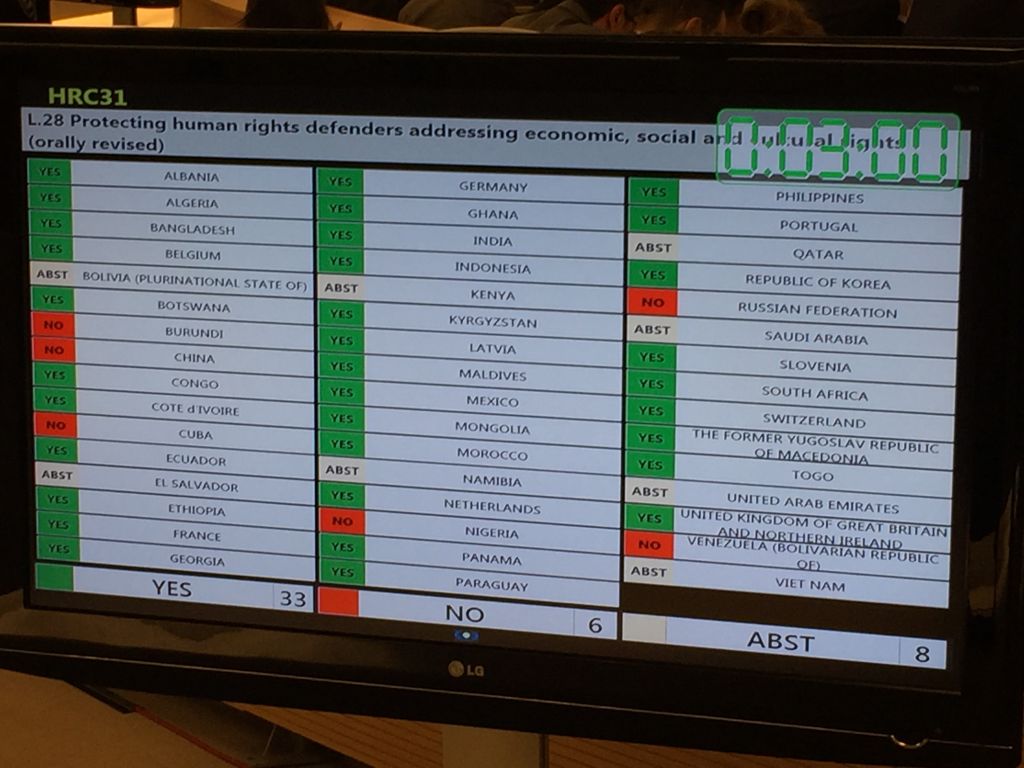“The resolution on human rights defenders remains strong and principled, having resisted hostile amendments intended to weaken it by some States. We welcome the additional protections it provides,” commented Florian Irminger, Head of Advocacy at Human Rights House Network.
“In contrast, the resolution on peaceful protest does not reflect precisely enough the recommendations of the Special Rapporteurs. The Council had to resist hostile amendments and even attempts by States to hijack the resolution as a means to block the right to protest, and to justify the arrest of those organising peaceful protests,” commented Florian Irminger.
“Add to this the proposed resolution on terrorism and human rights presented by Egypt. This resolution, adopted by a majority of the Council, undermines civil society space through the pretext of anti-terror provisions – going as far as proposing provisions that could see civil society actors charged as propaganda agents,” continued Florian Irminger.
Resolution on Human Rights Defenders
The resolution on human rights defenders was passed by 33 votes to 6, with 8 abstaining.
 Vote of the Human Rights Council on 24 March 2016 in favour of the resolution on human rights defenders
Vote of the Human Rights Council on 24 March 2016 in favour of the resolution on human rights defenders
“It is positive that so many states stood up and opposed attempts to weaken the resolution. This is a clear and welcome signal by the international community that it opposes the increasingly restrictive climate in which human rights defenders work,” commented Florian Irminger.
The resolution provides the following essential protections for human rights defenders:
- Investigating corruption – Strongly supports those working on corruption cases and seeking to publicise information related to this, recognising that these persons are human rights defenders and that their activity is intrinsic in protecting human rights. This acknowledges the pressing need to protect human rights defenders such as Khadija Ismayilova, who is serving a 7.5 year sentence in Azerbaijan for her legitimate work investigating corruption.
- Work on any right – Affirms the right of everybody to work on the promotion of any human rights, not just those defined and seen as admissible by the State.
- Assembly, association, expression – Emphasises the need for all human rights defenders, whatever right they work on, to be able to fully enjoy the rights to freedom of assembly, association, and expression.
- Advocacy – Introduces the notion of advocacy for human rights, expressing that the Council should not just promote rights, but also advocate changes to national legal frameworks, in order to ensure the protection of human rights.
- Positive contribution of HRDs – Underlines the positive contribution of civil society, be it in consultations leading to new legislation or policies, or in mediation. This counters the discourse of States who suggest human rights defenders are agitators working against the interests of the State, and supports HRHN’s commentary that the key to widening civil society space is for authorities to understand and acknowledge the value of civil society.
- Family and legal representatives – Continues to underline the need for protection of family members and legal representatives, recognising the reality of reprisals against family members and the risks human rights lawyers face for their work. Intigam Aliyev’s continued imprisonment in Azerbaijan an ever-present reminder of this repression.
Read HRHN’s statement on the situation of human rights defenders, delivered to the Council on 3 March 2016.
Despite the positives, HRHN is concerned by the hostile amendments proposed by a coalition of states – led by the Russian Federation, China, Egypt, Cuba, and Pakistan – to weaken the resolution, as well by the actions of countries that forced a vote on the resolution. The amendments sought to, among other things, remove references to the term “human rights defenders,” omit recognition of the legitimacy of their work, and to weaken their protection against attacks and reprisals.
Resolution on Peaceful Protest
The peaceful protest resolution was passed by 31 votes to 5, with 10 abstaining.
“The resolution on peaceful assembly did not propose anything ground-breaking, but rather aimed to reaffirm existing rights to protest and assemble, based on the compilation prepared by by Special Rapporteurs Maina Kiai and Christof Heyns,” commented Florian Irminger. “Despite this, States led by the Russian Federation proposed amendments to weaken it and in some instances even hijack the resolution. It was essential that States opposed these amendments.”
The proposed amendments contradicted the intentions of the Special Rapporteurs. If adopted, they would have held organisers of protests responsible for acts committed by other participants. This challenged the Special Rapporteurs’ clear assertion that it is the intention of the organisers that should inform whether they organised a peaceful protest. The amendments also sought to remove explicit mention of the right to protest.
These amendments were led by the Russian Federation, Egypt, Cuba, Venezuela, and Pakistan.
Read HRHN’s statement on peaceful protest, delivered to the Council on 9 March 2016.
Documents:
- Joint NGO letter supporting HRD resolution
Urges States to support resolution on the protection of human rights defenders addressing economic, social, and cultural rights. - Joint NGO letter opposing amendments to Peaceful Protest resolution
Civil society organisations urge States to reject amendments to Human Rights Council resolution on “the promotion and protection of human rights in the context of peaceful protests” (HRC/31/L.21) - Joint NGO letter opposing resolution on terrorism and human rights
States must vote against Human Rights Council resolution on “the effects of terrorism on the enjoyment of human rights” (HRC/31/L.13)





